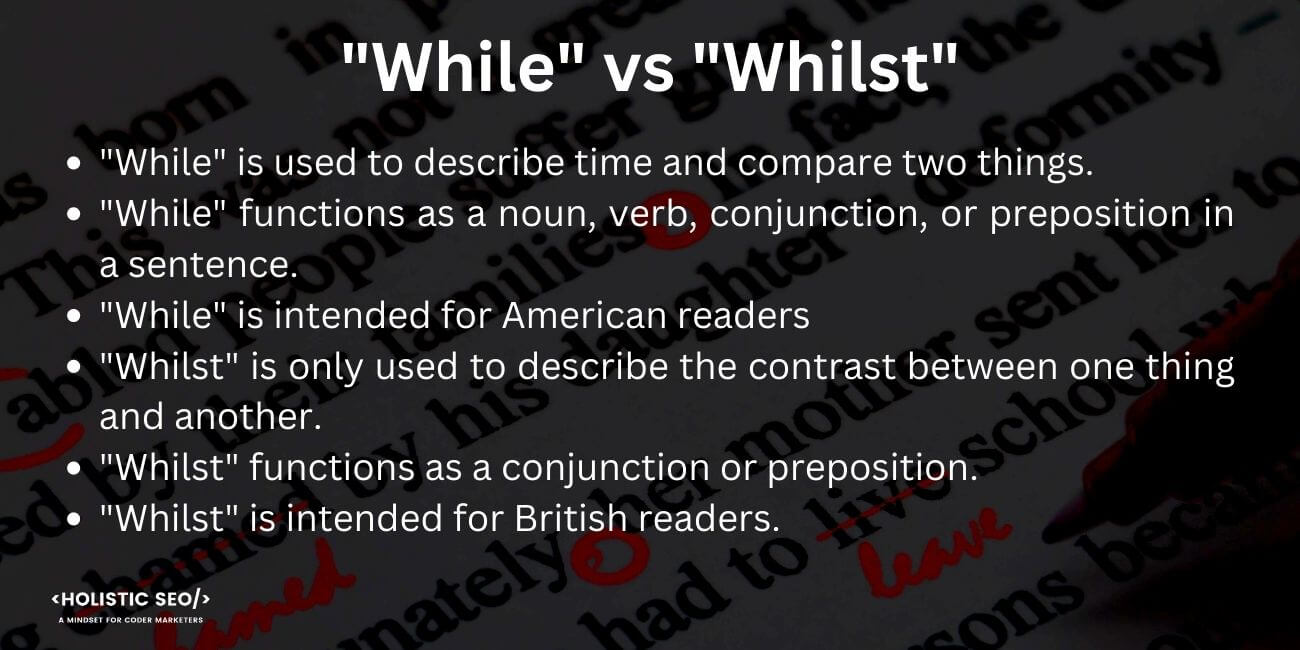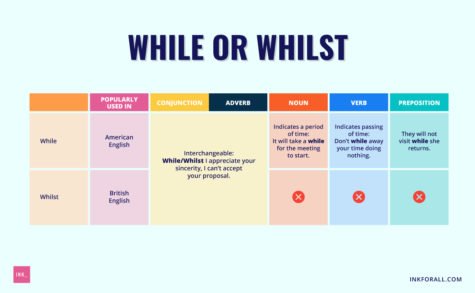whereas v while uk
Associated Articles: whereas v while uk
Introduction
On this auspicious event, we’re delighted to delve into the intriguing matter associated to whereas v while uk. Let’s weave attention-grabbing info and provide recent views to the readers.
Desk of Content material
Whereas vs. While: A Deep Dive into the Subtleties of UK English Conjunctions

The English language, notably its variations throughout totally different areas, is an interesting tapestry woven with nuances and delicate distinctions. One such space of intrigue lies within the seemingly interchangeable use of "whereas" and "while" – two conjunctions that, whereas functionally related, carry distinct stylistic connotations throughout the context of UK English. This text will discover the intricacies of their utilization, inspecting their grammatical capabilities, stylistic preferences, and the evolving panorama of their utility in trendy writing and speech.
Grammatical Equivalence and Semantic Overlap:
At their core, each "whereas" and "while" operate as subordinating conjunctions, introducing a subordinate clause that expresses simultaneity, distinction, or concession relative to the primary clause. They primarily hyperlink two clauses, indicating that the actions or states described in every clause happen concurrently, distinction with one another, or occur regardless of one another.
-
Simultaneity: "Whereas I used to be strolling house, I noticed a fox." This sentence signifies that seeing the fox occurred concurrently with the act of strolling house. The identical which means is conveyed utilizing "while": "While I used to be strolling house, I noticed a fox."
-
Distinction: "Whereas he’s rich, he isn’t comfortable." This sentence reveals a distinction between wealth and happiness. Once more, "while" can substitute "whereas" with out altering the core which means: "While he’s rich, he isn’t comfortable."
-
Concession: "Whereas I perceive your considerations, I can not agree along with your proposal." This sentence acknowledges the considerations however expresses a dissenting opinion. The equal utilizing "while" works equally nicely: "While I perceive your considerations, I can not agree along with your proposal."
The grammatical interchangeability, at the very least in most contexts, is plain. Each conjunctions introduce adverbial clauses of time, cause, or distinction, successfully performing the identical grammatical operate. The distinction, due to this fact, lies not in grammar however in type and register.
Stylistic Variations and Register:
The first distinction between "whereas" and "while" lies of their stylistic register. "Whereas" is taken into account the extra versatile and extensively accepted choice, appropriate for each formal and casual contexts. It is the default alternative in most writing types, from tutorial papers to informal emails. Its prevalence makes it the extra impartial and fewer attention-grabbing of the 2.
"While," then again, carries a distinctly extra formal and literary tone. It evokes a way of magnificence and class, typically related to older types of English. Its use suggests a deliberate option to make use of barely extra refined language. Whereas not grammatically incorrect, overusing "while" in casual settings can sound affected and even pretentious.
Think about these examples:
- Casual: "Whereas I used to be on the retailer, I purchased some milk."
- Formal: "While conducting the experiment, the researcher noticed an surprising anomaly."
The distinction in register is instantly obvious. The primary sentence feels pure and unassuming, whereas the second sentence possesses a extra polished and tutorial really feel, because of the inclusion of "while."
Historic Context and Evolution:
The phrase "while" is an older type of "whereas," a contraction of "whereas that." It is a remnant of Center English and retains a powerful connection to the historic evolution of the language. Over time, "whereas" gained wider acceptance and have become the dominant type, relegating "while" to extra specialised makes use of.
Nevertheless, "while" hasn’t disappeared totally. It persists in sure regional dialects and continues to carry a distinct segment in formal writing, notably in British English. Its continued use displays a acutely aware resolution to keep up a connection to conventional linguistic types and to imbue writing with a particular stylistic flavour.
Regional Variations and Utilization Patterns:
Whereas each "whereas" and "while" are understood all through the UK, their relative frequency of use can fluctuate regionally and throughout totally different demographic teams. "While" is perhaps extra prevalent in sure areas or amongst particular age teams who favour a extra conventional or literary type of talking and writing. Nevertheless, general, "whereas" stays the much more widespread alternative in trendy British English, throughout all registers.
The Debate: Prescriptivism vs. Descriptivism:
The selection between "whereas" and "while" typically turns into a focus in discussions about prescriptivism versus descriptivism in linguistics. Prescriptivists would possibly argue for the popular use of "whereas" on account of its wider acceptance and neutrality, suggesting that "while" is overly formal and even archaic. Descriptivists, then again, would acknowledge the continued utilization of "while" and its distinct stylistic operate, recognizing its legitimacy throughout the context of particular writing types and regional variations.
In the end, the selection is determined by the specified impact and the context of the writing or speech. There isn’t any inherent grammatical error in utilizing "while," however its stylistic implications must be fastidiously thought-about.
Trendy Utilization and Tendencies:
In up to date writing and speech, "whereas" stays the dominant type. Its versatility and neutrality make it the go-to choice for many writers and audio system. Nevertheless, "while" persists, particularly in additional formal or literary contexts. Its continued use demonstrates that even seemingly out of date phrases can preserve a presence within the language, including depth and nuance to expression.
The rising informality of written communication would possibly lead some to imagine that "while" is changing into more and more uncommon. Nevertheless, its use in particular genres, reminiscent of authorized paperwork or historic fiction, stays robust. This highlights the significance of understanding the stylistic implications of phrase alternative and choosing probably the most applicable conjunction based mostly on the supposed viewers and function.
Conclusion:
The selection between "whereas" and "while" will not be merely a matter of grammatical accuracy; it is a stylistic resolution. "Whereas" is the versatile, extensively accepted choice appropriate for many contexts. "While," then again, provides a contact of ritual and magnificence, appropriate for particular stylistic goals. Understanding the delicate variations in register and the historic context of those conjunctions permits for extra acutely aware and efficient phrase alternative, enriching the precision and influence of written and spoken English. In the end, the only option is determined by the specified impact and the particular context wherein they’re used. The continued coexistence of those two phrases highlights the dynamic and ever-evolving nature of the English language.








Closure
Thus, we hope this text has offered helpful insights into whereas v while uk. We thanks for taking the time to learn this text. See you in our subsequent article!